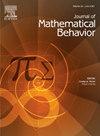从数学游戏到好玩的数学
IF 1.7
Q3 EDUCATION & EDUCATIONAL RESEARCH
引用次数: 0
摘要
数学游戏可以支持学生的代理和参与,提供学习的好处,并培养富有成效的数学倾向。然而,关于数学游戏的大量研究调查了幼儿自然游戏或学生在电子游戏等非正式空间中的游戏中出现的数学。我们引入了术语“好玩的数学”来描述能够促进数学游戏的教学环境的活动和特征,并研究了将好玩的任务设计元素融入代数活动的效果。通过对中学生进行的两个小组教学实验,第一个有两个参与者,第二个有三个参与者,我们确定了13种表征学生数学游戏活动的现象:竞争性乐趣、感到自豪、享受、惊奇、获得权威、扰动、投资、沉浸、代理、毅力、创造性/不寻常、更难的数学和笑声。我们发现,在有趣的数学任务中,除了惊奇和扰动之外,所有现象都发生得更多。我们描述了两个例证数学游戏现象的小插曲,并讨论了任务设计和教学的含义。本文章由计算机程序翻译,如有差异,请以英文原文为准。
From mathematical play to playful math
Mathematical play can support student agency and engagement, offer learning benefits, and foster productive mathematical dispositions. However, the bulk of research on mathematical play investigates the mathematics that emerges in young children’s natural play or in students’ play in informal spaces such as video games. We introduce the term “playful math” to describe the activities and features of an instructional environment that can facilitate mathematical play, and we investigate the efficacy of incorporating playful task design elements into algebra activities. Drawing on two small-group teaching experiments with middle-school students, the first with two participants and the second with three participants, we identified 13 phenomena characterizing students’ mathematical play activity: Competitive Fun, Feeling Proud, Enjoyment, Wonderment, Taking on Authority, Perturbation, Investment, Immersion, Agency, Perseverance, Creative/Unusual, Harder Math, and Laughter. We found that all phenomena except Wonderment and Perturbation occurred more during playful math tasks. We describe two vignettes exemplifying the mathematical play phenomena and discuss implications for task design and instruction.
求助全文
通过发布文献求助,成功后即可免费获取论文全文。
去求助
来源期刊

Journal of Mathematical Behavior
EDUCATION & EDUCATIONAL RESEARCH-
CiteScore
2.70
自引率
17.60%
发文量
69
期刊介绍:
The Journal of Mathematical Behavior solicits original research on the learning and teaching of mathematics. We are interested especially in basic research, research that aims to clarify, in detail and depth, how mathematical ideas develop in learners. Over three decades, our experience confirms a founding premise of this journal: that mathematical thinking, hence mathematics learning as a social enterprise, is special. It is special because mathematics is special, both logically and psychologically. Logically, through the way that mathematical ideas and methods have been built, refined and organized for centuries across a range of cultures; and psychologically, through the variety of ways people today, in many walks of life, make sense of mathematics, develop it, make it their own.
 求助内容:
求助内容: 应助结果提醒方式:
应助结果提醒方式:


